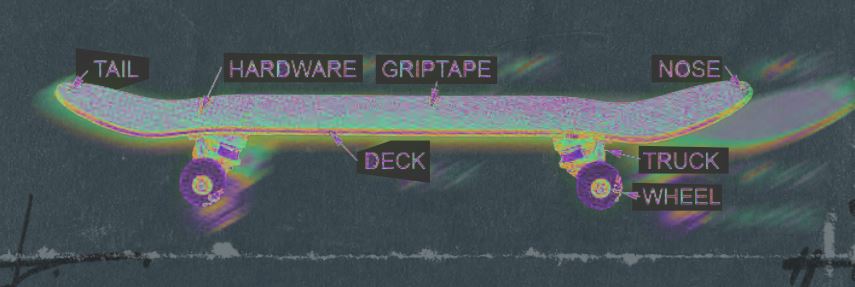
Prehistory
The first skateboards were homemade—rigged up by nailing roller skate wheels to whatever boards of wood were lying around. In the late 50s, the first ‘skate boards’ were produced, with plastic decks and wheels made from steel. No trucks. The things were deadly.
Most popular in California, early skaters were mostly surfers looking for something to do when there were no waves. They called it ‘sidewalk surfing’ back then.
And then the inventions started happening.
+++
1962 –
The first adjustable trucks were invented, called the Chicago trucks, giving riders some kind of control.
Wheels made from clay, a small improvement on steel wheels, were also introduced.
1964 –
They started making decks out of wood and fiberglass—way the fuck better than plastic.
1969 –
Boards get kicktails, making some of the first modern tricks possible.
1972 –
This was the big year. The urethane skateboard wheel came out. These wheels were tough, but they were soft enough that you wouldn’t bail every time you ran over a little rock.
1975 –
Wheels get even better with the addition of ball bearings, upping speed and smoothness.
1976 –
Vans releases the Era, the first shoe designed for skaters.
1978 –
Trucks are perfected to almost their modern form by the Independent Truck Company.
1978 – 1988
Pros experiment with custom boards that have different sizes and shapes.
1989
World Industries releases the Mike Vallely Barnyard deck. Its symmetrical double kick design creates the first modern ‘popsicle’ skateboard.
+++
“For me, skateboarding started in 1965, so by the time the Dogtown era came around I’d already been skatin’ for 10 years. When I started it was clay wheels and mostly homemade decks. We were just trying to copy surfing.”
– Jay Adams (https://selvedgeyard.com/2012/12/23/the-unlocking-of-americas-cement-playground-dogtown-z-boys/)
“I started with a clay wheeled Super Surfer in the early 1970’s, a short time after that urethane wheels came on to the market as replacement wheels, they were an amazing improvement. Small cracks in the sidewalk, or those mini-pinecones from Australian pine trees were no longer a death sentence.”
– Steve Marinak (https://copingblock.blogspot.com/2010/11)
